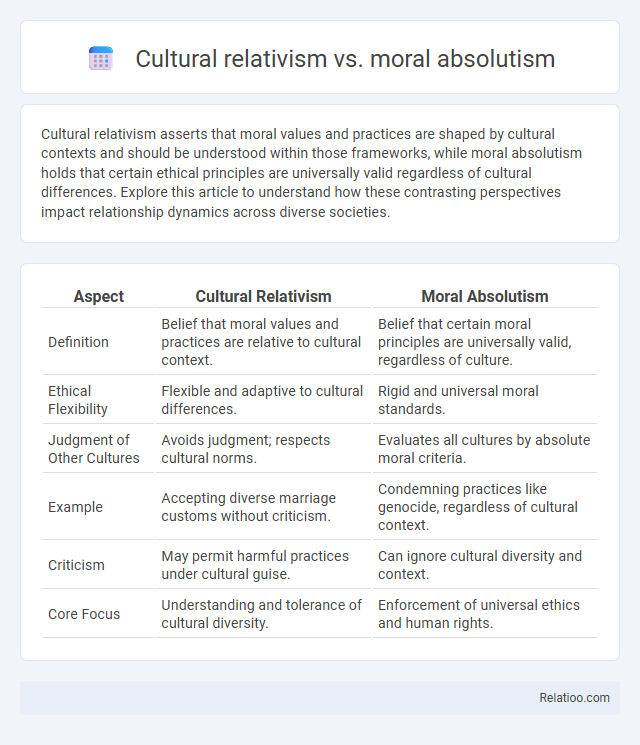Cultural relativism asserts that moral values and practices are shaped by cultural contexts and should be understood within those frameworks, while moral absolutism holds that certain ethical principles are universally valid regardless of cultural differences. Explore this article to understand how these contrasting perspectives impact relationship dynamics across diverse societies.
Table of Comparison
| Aspect | Cultural Relativism | Moral Absolutism |
|---|---|---|
| Definition | Belief that moral values and practices are relative to cultural context. | Belief that certain moral principles are universally valid, regardless of culture. |
| Ethical Flexibility | Flexible and adaptive to cultural differences. | Rigid and universal moral standards. |
| Judgment of Other Cultures | Avoids judgment; respects cultural norms. | Evaluates all cultures by absolute moral criteria. |
| Example | Accepting diverse marriage customs without criticism. | Condemning practices like genocide, regardless of cultural context. |
| Criticism | May permit harmful practices under cultural guise. | Can ignore cultural diversity and context. |
| Core Focus | Understanding and tolerance of cultural diversity. | Enforcement of universal ethics and human rights. |
Introduction to Cultural Relativism and Moral Absolutism
Cultural relativism asserts that moral values and ethical practices are culturally dependent, meaning what is considered right or wrong varies between societies and should be understood within their unique cultural contexts. Moral absolutism, on the other hand, holds that certain ethical principles are universal and unchanging, applicable to all humans regardless of cultural background. Understanding these concepts helps you navigate complex moral debates by recognizing that ethical judgments may either stem from fixed, universal laws or from culturally specific traditions and norms.
Defining Cultural Relativism: Key Concepts
Cultural relativism defines moral values and norms as relative to specific cultural contexts, emphasizing that no single ethical framework is universally applicable. It contrasts with moral absolutism, which asserts fixed, unchanging moral principles across all cultures and situations. This approach encourages understanding behaviors and beliefs within their cultural environments, promoting tolerance and reducing ethnocentric judgments.
Understanding Moral Absolutism: Foundational Principles
Moral absolutism asserts that certain ethical principles are universally valid, regardless of cultural differences, emphasizing unchanging standards such as justice and human rights. This perspective rejects cultural relativism's view that morality is context-dependent and varies between societies, instead promoting objective norms rooted in universal human values. Understanding these foundational principles highlights the tension between respecting cultural diversity and upholding consistent moral laws applicable to all humanity.
Historical Origins and Philosophical Roots
Cultural relativism, rooted in early 20th-century anthropology, emphasizes understanding moral systems within specific cultural contexts, tracing back to Franz Boas and Ruth Benedict's work on cultural diversity. Moral absolutism originates from ancient philosophical traditions, notably Plato and Immanuel Kant, asserting universal ethical principles independent of cultural differences. The debate reflects differing views on whether morality is culturally constructed or grounded in immutable truths, influencing modern ethical theory and cross-cultural dialogue.
Major Arguments Supporting Cultural Relativism
Cultural relativism emphasizes that moral values and ethical standards are shaped by cultural contexts, asserting that no universal morality exists beyond these cultural boundaries. Major arguments supporting cultural relativism highlight the respect for cultural diversity, the avoidance of ethnocentrism, and the recognition that practices deemed moral in one society could be immoral in another. Your understanding of ethics improves by appreciating that judgment should be context-specific rather than based on fixed, absolute principles.
Core Critiques of Moral Absolutism
Moral absolutism faces core critiques for its rigidity in applying unchanging ethical principles across diverse cultures, often ignoring contextual nuances that shape moral judgments. This approach can lead to ethnocentrism by imposing one culture's moral standards on others, undermining the validity of cultural diversity acknowledged by cultural relativism. Your understanding of morality benefits from recognizing that cultural relativism highlights the importance of context and cultural frameworks, challenging the inflexibility inherent in moral absolutism.
Cultural Relativism in Global Ethics and Society
Cultural relativism in global ethics emphasizes understanding and evaluating moral systems within the specific cultural context, rejecting universal moral standards imposed across diverse societies. This approach fosters respect for cultural diversity and challenges moral absolutism, which asserts fixed, universal ethical principles applicable to all cultures regardless of context. By prioritizing cultural norms and values, cultural relativism promotes tolerance and dialogue in international relations and global societal interactions.
Moral Absolutism and Universal Human Rights
Moral absolutism asserts that certain ethical principles are universally valid, independent of cultural differences, anchoring the framework of universal human rights which claim inalienable protections for all individuals. This perspective challenges cultural relativism, which argues that moral values and human rights are context-dependent and shaped by cultural norms. Upholding moral absolutism is vital for establishing global standards that combat human rights violations and promote justice across diverse societies.
Case Studies: Real-World Applications and Conflicts
Case studies in cultural relativism reveal diverse ethical practices like female genital mutilation in some African societies, where local norms justify the practice despite global human rights criticisms. Moral absolutism is evident in universal laws against torture, upheld by international bodies regardless of cultural context, leading to conflicts with countries citing cultural exceptions. Real-world applications highlight tensions between respecting cultural differences and enforcing absolute moral standards, such as in debates over LGBTQ+ rights in traditionally conservative cultures that oppose them on moral absolutist grounds.
Conclusion: Navigating Between Relativism and Absolutism
Navigating between cultural relativism and moral absolutism requires balancing respect for diverse cultural practices with adherence to universal ethical principles. You must critically evaluate contexts to avoid cultural bias while upholding fundamental human rights recognized globally, such as freedom and justice. This approach fosters ethical decision-making that honors both cultural diversity and moral consistency.

Infographic: Cultural relativism vs Moral absolutism
 relatioo.com
relatioo.com